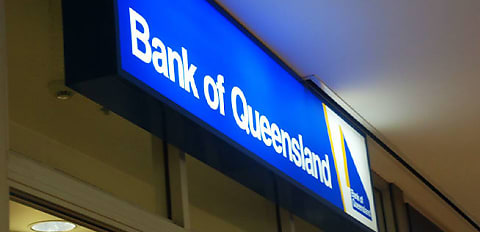ASX-listed lending group Bank of Queensland (BOQ) Group revealed its financial results for the year ended 31 August 2023 yesterday (11 October), in which it revealed that its overall housing loan book contracted in the year.
The group said the housing loan contraction of $682 million was due to “prudent capital deployment and the prioritisation of economic return over volume growth in a highly competitive market”.
Application volumes dropped to 41,900 over the year, down from 53,100 the year before.
When looking at the group’s retail lending brands – BOQ, ME and Virgin Money – home lending growth fell by $741 million, a stark contrast to the prior year when it grew by over $3.7 billion.
Broker flows continued to increase, with BOQ revealing that the third-party channel originated 59 per cent of its mortgages in FY23, up from 55 per cent in FY22.
Overall, brokers have written 48 per cent of the group’s mortgage portfolio (up from 45 per cent).
While mortgage growth has slowed, the group saw an increase in business lending.
The business loan grew by $627 million over the year, which was attributed to a focus on key SME areas of healthcare, agriculture and equipment finance as well as owner-occupied commercial property lending.
In total, the group’s loan book growth dropped by 1 per cent, while its business loan growth grew 4 per cent compared to FY22.
Despite the rising rate environment, the group revealed an improvement in the quality of its housing loan portfolio in FY23, with an increase in conservative LVR (loan-to-value ratio) lending. Around 98 per cent of customers had an LVR of 90 per cent or less, while the flow of loans with an LVR over 90 per cent was only 1.5 per cent.
Furthermore, the FY23 flows from home loan customers with an LVR of greater than 80 per cent reduced to 8.7 per cent, down from 11 per cent in FY22.
Approximately half of mortgagors had a repayment buffer of one year or more.
The results showed that 27 per cent of the bank’s housing portfolio is currently on a fixed-rate loan, with the fixed-rate ‘maturity tower’ to peak in 1H24. It said it had an “ongoing focus on proactively supporting customers transitioning from fixed to variable rate loans”.
Looking forward, the group said it anticipates “increasing risk” in FY24 ending August 2024, due to the lagging impact of interest rates and the elevated cost of living.
BOQ also acknowledged its two court enforceable undertakings, which it said it was “embracing” with “a focus on building stronger foundations through financial and operation resilience, and improved risk culture”.
The new managing director and chief executive of BOQ, Patrick Allaway, said the group is committed to its risk remediation programs with both the Australian Prudential Regulation Authority (APRA) and the Australian Transaction Reports and Analysis Centre (AUSTRAC).
“We recognise that this has been a difficult year for our shareholders and take accountability for the operational risk failings that led to the two court enforceable undertakings,” Mr Allaway stated.
“We have high conviction in our strategy and a clear roadmap in place to deliver a stronger, simpler, digitally enabled, low-cost bank with exceptional experience.
“We are committed to addressing our challenges head-on, and our transformation is progressing at pace with key milestones achieved in FY23.”
The strategy Mr Allaway referred to was BOQ’s aim to simplify the group, which said it was “targeting cost productivity benefits of $200 million over three years”.
An example of the program was through the increased use of automation, with 45 per cent of key processes automated in FY23 with the group looking to reach over 80 per cent across FY24–FY26, along with a reduction of home loan origination costs by 50 per cent.
Looking ahead, BOQ Group stated that it anticipated that “mortgage pricing will need to adjust at some point to provide returns above banks’ cost of capital” and projected housing credit to grow by 3.5 per cent in FY24.
The non-major lender group said that its 147 branches “remains a key differentiator for BOQ”, along with its over 17,800 accredited brokers.
According to the group, in FY23 it achieved a 2.82 per cent market share for housing and a 1.47 per cent market share for business, excluding the BOQ Finance brand.
BOQ also forecast unemployment to rise to 4.5 per cent by the end of FY24, with households continuing to benefit from the strong labour market despite consumer confidence being “heavily impacted by the rise in the cost of living and higher interest rates”.
FY23 results saw a 70 per cent decrease in the group’s statutory NPAT (net profit after tax) from FY22, down to $124 million.
The reduction was previously flagged by BOQ when it said earlier this month its FY23 results would be impacted by $35 million (after tax) in restructuring costs, which included redundancy-related costs and $44 million (after tax) in integration costs to do with its acquisition of Members Equity Bank Limited (ME).
[Related: BOQ reveals redundancy costs ahead of FY23 results]

